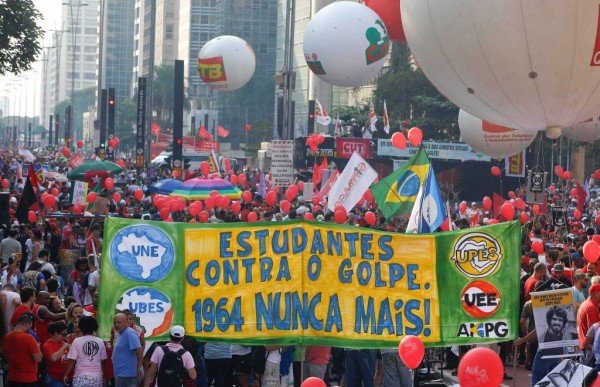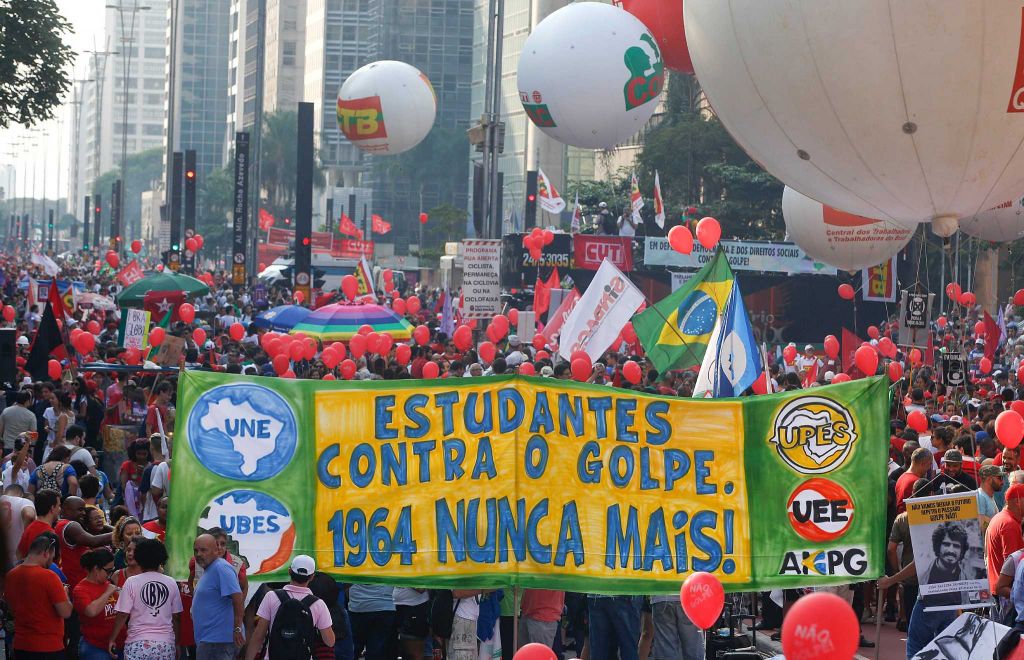Tens of thousands of people have joined pro-Dilma Rousseff rallies in Brazil to show support for the president who is facing calls for her impeachment.
Earlier, police used tear gas on anti-government protesters in Sao Paulo.
Several protests against Dilma Rousseff erupted two days ago after she appointed the former Brazilian president, Luiz Inacio Lula da Silva, as a minister.
Meanwhile, a Supreme Court judge has suspended Luiz Inacio Lula da Silva’s nomination as minister.
The decision is not final, and the government can appeal. In naming Luiz Inacio Lula da Silva, Dilma Rousseff is accused of shielding him from charges of money-laundering, which he denies.
Luiz Inacio Lula da Silva, who remains a popular leader, addressed protesters early in the evening. Wearing a red shirt, he said: “There will not be a coup against Ms Rousseff.”
The former president also said the opposition did not accept the results of the 2014 election, in which Dilma Rousseff was re-elected for another four-year term.
“Democracy is the only way to allow people to participate in government’s decisions,” he told a cheering crowd.
Luiz Inacio Lula da Silva said he was joining Dilma Rousseff’s government to help the country and said Brazil, which is in its worst recession in decades, needed to resume growth.
Organizers said about 300,000 people demonstrated there, but the respected Datafolha institute put that number at 95,000.
Smaller rallies were also held in Rio de Janeiro, Brasilia and dozens of other cities.
Hours earlier, riot police dispersed anti-government protesters who had blocked the same central Sao Paulo thoroughfare since March 16, when demonstrations erupted against Luiz Inacio Lula da Silva’s appointment as minister.
The nationwide rallies on March 18 were the first time the government had massed the ranks of supporters since Luiz Inacio Lula da Silva was briefly arrested earlier this month.
They came after mass protests across Brazil on March 13 against corruption and calling for Dilma Rousseff’s departure. Estimates of the turnout range from one million to three million demonstrators.
Opponents who have called for Dilma Rousseff’s removal also accuse her of economic mismanagement and involvement in a sprawling corruption scandal in the state oil company Petrobras.
Dilma Rousseff denies wrongdoings, and has accused her rivals of mounting a “coup” against her.
The president insisted that she appointed Luiz Inacio Lula da Silva, who had started to make overtures to stand for president in 2018, to help her rebuild her political base in Congress and fight the impeachment proceedings.
However, Supreme Court judge Gilmar Mendes suspended Luiz Inacio Lula da Silva’s nomination as chief of staff on March 18, saying it was an intention to interfere in investigations.
Opponents had argued that Dima Rousseff’s decision was unconstitutional and obstructed justice, as it was a move made to grant Luiz Inacio Lula da Silva immunity from money-laundering charges that he denies.
As a minister, any charges against the former leader could only be dealt with by the Supreme Court, which operates more slowly, and not by the judge in the southern city of Curitiba who is overseeing Operation Car Wash into allegations of corruption at Petrobras.
Dilma Rousseff and her supporters accuse judge Sergio Moro of political interference.
Meanwhile, an impeachment committee in the lower house of Congress held its first session on March 18 and said it expected to reach a decision within a month on whether to recommend removing Dilma Rousseff.
The process is over allegations that Dilma Rousseff broke the law managing the federal budget in 2014, when she was running for re-election.
https://www.youtube.com/watch?v=ZItSTKDvafY
